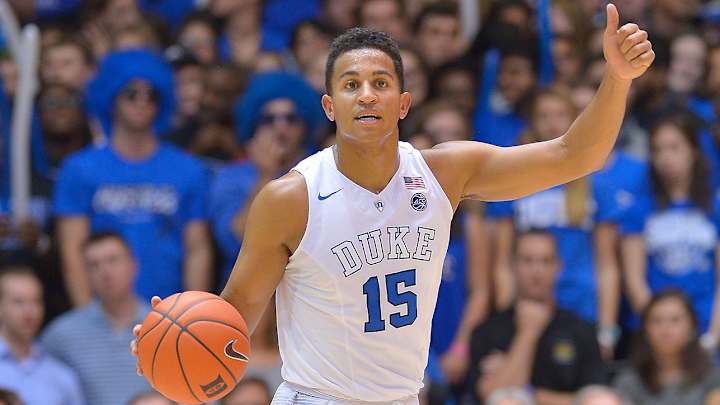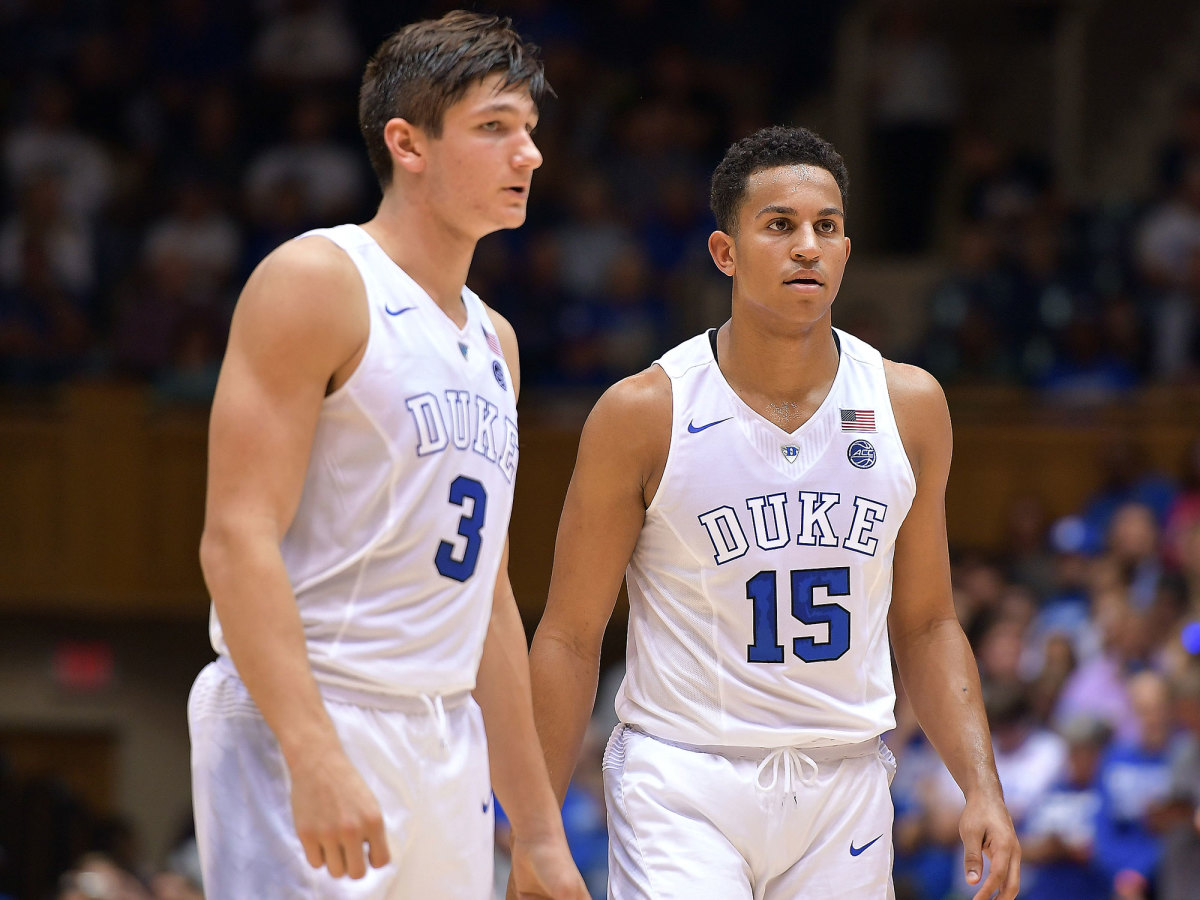Frank Jackson finds a new calling as Duke's point guard

DURHAM, N.C. — “All of this is kind of surreal,” Frank Jackson says, sitting in a very real conference room at Cameron Indoor Stadium, just a few minutes before heading to a very real class at Duke. “It’s like, am I really here right now?”
It’s all still just a smidge crazy to him, even in late October, long after he arrived in many different ways. Roughly 24 months earlier, Jackson was a star in the small pond of Utah, a state not known for elite basketball talent. He had been committed to play for BYU since he was 14, a proud basketball school—but by no means a powerhouse—18 miles from home in Alpine. He was anticipating serving on a Mormon mission after high school, which meant college basketball could have been years away.
Now, Frank Jackson is expected to help Duke win a national championship. He is one of the most talented first-year guards in the country, a McDonald’s All-American whose ability eventually transcended his home state. His size (6' 3" and a stout 205 pounds) and his ability to push pace and defend 94 feet make him a vital asset to the loaded Blue Devils, as evidenced by the 19.5 ppg, 3.0 apg and ACC freshman of the week honors he’s already picked up in two games. He also happens to be the one member of a renowned freshman class who came into the spotlight quickly, a dynamic that may be useful to him.
• Hoop Thoughts: What we learned on opening weekend
Everyone is entitled to envision great things for Jackson and his team this season. Jackson, meanwhile, focuses on the times he felt entitled to nothing. “Every time I played, I always felt like I had to prove myself,” Jackson says. “I always played with a chip on my shoulder because people maybe would say, ‘He’s from Utah, he can’t be that good, he’s not playing against any competition.’ So when I did play against the top players in the country, during AAU events and stuff, I would go after it. I would get after it, because I wanted to show people I belonged.”
There were no questions about that by last winter, when he was the first Utah player named to the boy’s McDonald’s All American in 16 years. (You have to go back Garner Meads in 2000 for a previous male participant.) Jackson averaged 28.1 points per game for Lone Peak High School as a senior and then won co-MVP honors in the McDonald’s game, scoring 19 points on 7-of-11 shooting, a day after adding that event’s dunk contest title to his honors haul.
“He’s really good, and we want him to be really good,” Duke associate head coach Jeff Capel says. “I wouldn’t say [he has to] fit in—just be who you are and to understand how that meshes with everyone else. He’s a guy that can be a playmaker for us. He can be a scorer for us. He’s maybe our best on-the-ball defender. He’s learning how to talk more. He’s learning how to lead more. He’s learning how to run a team a little more, all those things. But we don’t want him thinking too much. We want him reacting. We want him playing. We want him attacking.”

When he was in elementary school, living in Washington D.C. and then Oregon, Jackson watched BYU basketball and determined, as a young Mormon, that there was no better place for him. He and his mother would fly to Utah for BYU basketball camps, and the faith-based connection was all but soldered when the family eventually moved to Alpine. Jackson committed to play for the Cougars at the end of his freshman year in high school. It was, he thought, the fulfillment of a dream.
As time went on and his profile grew, Jackson suspected it was actually something else. “I made kind of a premature decision,” he says now. In Nov. 2014, he re-entered the recruiting fray.
It is one thing to renege on a commitment and change schools. It is something else to renege on a commitment and essentially change a life. Jackson was a Mormon player headed to a Mormon school, convinced he would take a Mormon mission like his older sisters and his friends. By reopening his recruitment and welcoming overtures from other schools like Duke, Jackson changed his path dramatically. He committed to the Blue Devils in September. Fortunately, his community reacted kindly. “They understood my situation. They understood the opportunity to come to Duke,” he says. “You have those people who are like, ‘You need to go to BYU,’ blah blah blah, but for the most part, people couldn’t have been nicer. They look at Duke, they look at the history of Duke, and they understand.”
SI.com's 2016–17 college basketball season preview
Still, the impulse to serve on a mission has not been easy to shake. Jackson’s sister served for a year and a half in Iquitos, Peru, a gateway city to the northern Amazon; she returned with tales of not-great food and days without hot water and rats in her apartment. “She definitely led a different life,” Jackson says. “I can’t do rats at all. I can’t even do mice.” He saw what his sister learned and realized he would not be able to mimic her experience exactly; what a high-profile freshman at Duke was left to do, instead, was use his visibility as best he could.
When Jackson began getting the simplest of questions on campus—such as What is a Mormon?—he found a different purpose. “As I look at it, Duke gives me a spotlight not a lot of other places can give,” Jackson says. “You get attention, you get a lot of media. So to be an example that way, to show people what I believe in in that sense, has been cool. I’ve had a lot of opportunities even in the past couple months to share what I believe or what I stand for.”

There is, of course, the basketball calling to attend to, with the Champions Classic clash against Kansas on Tuesday the first klieg-lit moment he’ll face. But Jackson, who has battled Grayson Allen in Duke practices, believes he’s ready. Allen’s constant movement, compounded by his outsize scoring ability, was and is a maddening combination to contend with. “At first,” Jackson says, “it stinks.”
But in those two-hours-a-week sessions before Capel left to help with Team USA at the Rio Olympics, the Duke aide noted how Jackson met Allen’s direct challenges: With similarly direct attacks. “He didn’t cower,” Capel says of Jackson. “He didn’t retreat.” Jackson rationalized the frustration he felt early on this way: He was facing one of the best players in the country and improving with every rep. And Allen has noticed Jackson’s improvement as well.
“He gets after it on both ends of the floor,” Allen says. “He really attacks guys defensively. Offensively he drives the ball really well and he’s so strong he’s able to get in there and finish. He can really play. He’s been really, really good so far. He has that competitive mentality where he just goes after guys in practice and he doesn’t stop.”
One shot: North Carolina's Isaiah Hicks has a last chance to make his own history
During the first few practices of October, Jackson says he still was feeling out a new role, trying to grasp the distributor’s mentality, easing up on the all-out attack mode that was required of him in high school. He looked to involve teammates more initially. The numbers so far suggest Jackson’s development may be ahead of schedule. Especially given the injuries to the other members of this vaunted freshman class—Harry Giles’s knee issues, Jayson Tatum’s foot sprain, Marques Bolden’s mysterious lower-leg injury—contributions from the lone healthy stud recruit will be necessary to give Duke the depth at least initially. “For me,” Jackson says, “I fit in right where I am.”
He may not have entirely processed the events that brought him to Duke. He may not have entirely processed the fact that he is indeed at Duke. But Frank Jackson seems to know exactly what he’s doing here.
